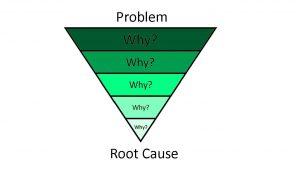The more I learn about Lean and Continuous Improvement the more I realize how many different topics and tools it entails. Because there are so many tools and topics it’s easy to get caught up in all of them and forget about the simple aspects of Lean and Continuous Improvement. There are many simple tools and concepts you probably already use on a daily basis but, have never thought about them as tools. One tool I find myself using often without even realizing it, is the 5 why’s tool. This is probably one of the simplest lean tools out there. 5 why’s is a questions-asking method used to determine the root-cause of a problem. It prompts you to continue asking the question why until you have found the underlying cause of the problem.
I actually recently used this method when helping a friend figure out why they can never find the papers they are looking for. The conversation went something like this:
Friend: “I can never find my papers when I need them in class,”
Me: “Why can’t you find your papers when you need them in class?”
Friend: “Because I don’t know where I put them,”
Me: “Why don’t you know where you put them?”
Friend: “Because they are never in the same place,”
Me: “Why are they never in the same place?”
Friend: “Because I don’t have a location to put my papers for certain classes,”
Me: “Why don’t you have a location to put your papers for certain classes?”
Friend: “Because I never established one,”
Me: “Why did you never establish one?”
Friend: “Because I never bought folders for my classes.”
Me: “Oh, well let’s go purchase folders so you have a place to put your papers.”
As you can see from the conversation, there was an easy solution to his situation but, my friend needed a little help mapping his way to the solution. The 5 why’s is a good tool to use when you don’t have any supplies to draw out a diagram and all you have is your brain and a problem. There are many lean tools that are just as simple as this one that can help make using lean in your everyday life simple!

Sophie, it is good to focus on the foundational thinking supporting a Lean practice. Tools-thinking can become complicated, overwhelming, and ineffective. Always driving toward killing the root cause of a problem is a great practice. Nice post.